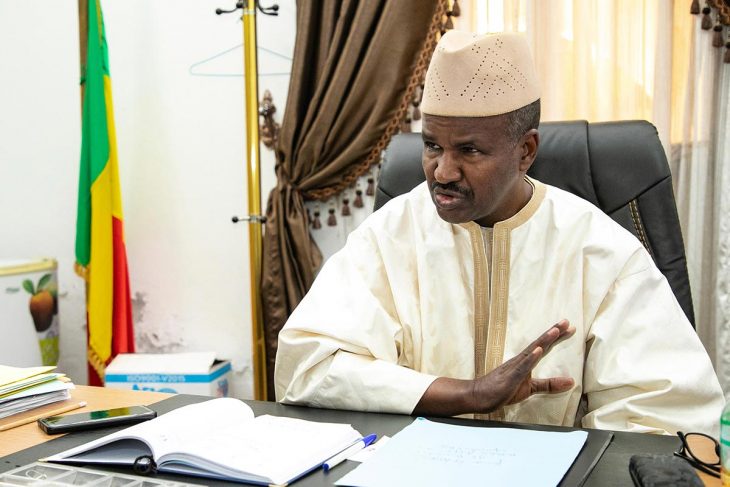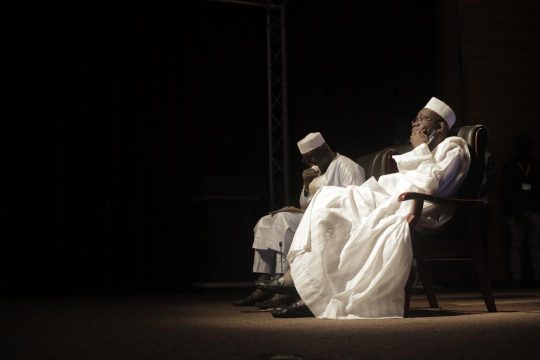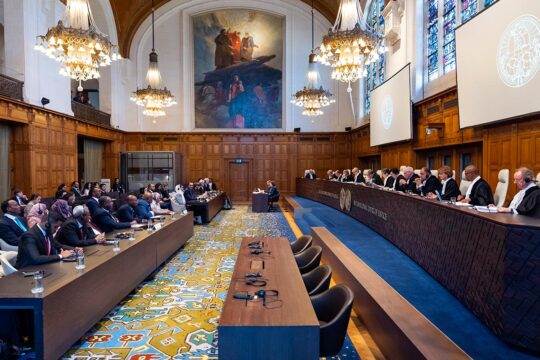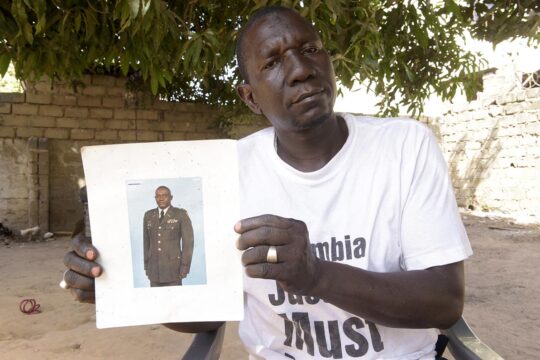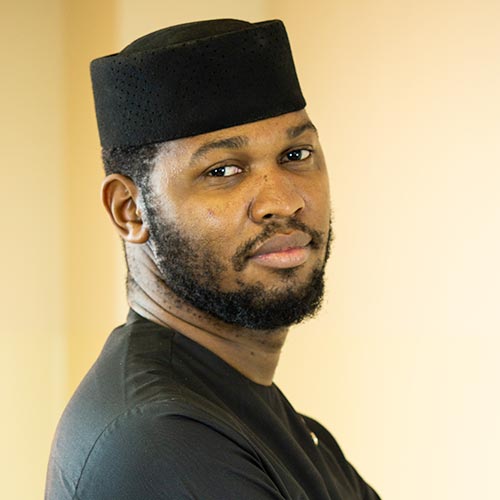JUSTICEINFO.NET: On the recommendation of the Truth, Justice and Reconciliation Commission (TJRC), the government in September signed a 65 billion CFA franc (100 million euro) reparations plan for victims of crises in Mali since 1960. How do you plan to mobilize such funds given the country's crisis?
OUSMANE OUMAROU SIDIBE: This won’t be done in one year, it is a multi-year plan. We have established an initial five-year plan, but it can go beyond that. It is the responsibility of the government to raise the money. The government will make funds available, a reparation structure will be set up, a reparation fund will be fed by the national budget but also by contributions from partners and perhaps also by certain taxes – although we don’t have a precise proposition on taxes yet. That is more or less our idea of where the funds will come from. For the moment, we can only help the government in its appeals to partners.
To date, what guarantees have you obtained, from whom and for how much?
At the government level, we already have a draft law on reparations. I think that in the coming weeks the government will opt for this bill and it will be submitted to the National Transitional Council [CNT, the Malian parliament], which is also prepared to adopt this reparations law during the transition period. The government's contribution will be determined when the law is passed. But, for sure, the government will be the first to participate in this fund. We have commitments from the government and the authorities of the country.
How was this figure calculated, and by whom?
We made the calculation ourselves. We met with all the departments of the Ministry of Finance: the budget department, the treasury, etc. We did it based on projections of the number of victims in our database and also on the different categories of victims: beneficiaries, deaths, cases of property destitution.
What kind of reparations are we talking about?
There are two types of reparations: financial reparations and memorial reparations. But this law is mainly about financial reparations. The heirs of victims who died during the conflict will be entitled to compensation. For those who lost property in the destruction of homes, for example, we have established categories of lump sum compensation, depending on what the home was made of. For each of these categories we have proposed a flat sum, it is simpler. For those who have lost flocks we have also proposed a package, with a ceiling. What we propose is to grant compensation for only half of the lost flock, with a ceiling. It is not a full compensation, but lump sums that we have proposed.
If the funds do not come, will you not have raised victims’ hopes in vain and risk accusations that your policy is just for show?
No, it is not just for show because part of our mandate is to propose reparations. This is what we have done. We met with all the associations, all the victims, all the categories of people in order to draw up this policy of inclusive reparations. What we have proposed is relatively small, especially for the loss of human life, although compared to Côte d'Ivoire and countries like Peru, it is quite high. It is quite high because there are existing laws: some amounts have [already] been proposed to the victims of March 1991 [popular uprising that preceded a coup], and to the victims of 2012 [another coup]. At the time, it was 200 people, so it was very limited. [The 200 victims compensated are those from 1991. The commission in charge of compensating the 2012 victims was never set up.] Now it is thousands of people. So we have proposed something that is well below, but still quite high by international standards.
What kind of sum?
These are still proposals, it is the government that will have the last word in a decree. That is why we don’t want to reveal the amount. Because if the government announces another amount, it could create problems.
On what basis are the beneficiaries of these reparations chosen, and how will they be distributed?
These are the people who have come to make their statements in our different offices. We now have more than 22,000 victims in our database. We have hired jurists to verify whether it is murder, torture, damage to property.
Some people come to make statements that do not fit into our mandate, they are not victims, so we do not include them. We will send the list of all the others to the reparations agency that is to be created. That agency will set up its own procedure on how to apply for these reparations. We cannot anticipate what criteria they will establish, but that is the mechanism.
According to some reports, you want to propose a policy of reparation through administrative channels. How and by whom will it be implemented, and how will victims have access to it? Why have you chosen this solution and not, for example, that of an independent commission?
Because, in reality, this is what all countries that have experienced this kind of crisis have done. Because if we let each victim go to court, it is an uncertain, very expensive and difficult path, especially for poor populations. That is why we proposed this law. Victims who agree to go this route will be compensated, but those who find that the compensation does not suit them can also go to court. But at that point, there will be no double reparation. This is what a country like Canada has done for the descendants of what they call the natives, and even Germany in relation to Nazism. Even in Côte d'Ivoire, what is recommended is a path of reparation through administrative channels. It is more consistent, it is standardized and it is easier for the victims.
So those who choose to go to court won’t have the right to reparation?
No, not double reparation.
How far-reaching will a reparations plan be in a country still ravaged by war?
It already gives hope to the victims. There are victims who, since 1960, have never received anything. So the very fact that we are proposing a policy of reparation today, while we are in the midst of a conflict, is likely to give hope and perhaps even lead some victims to renounce vengeance and wait. So, it is really useful. It may not be obvious, but this work is also one of the solutions to this crisis.
But there will surely be other victims after the Truth Commission has finished its work…
Yes, we have planned for that. In fact, the reparations agency that we're proposing will continue for a while. We're not going to stop taking statements from victims.
What will be the follow-up mechanisms to ensure that the reparations proposed are actually granted?
We have proposed that a reparations agency be set up even before the Truth Commission is closed. Before we leave, we will transfer the files, the databases, to this agency. Our idea is to begin setting up a reparations fund to start the first reparations in 2022.
As well as reparations, some victims have demanded in the public hearings to know the truth about their loved ones. What answer will you give them?
That is really the heart of our work. We are currently writing our final report. We will tell the truth about these violations. And we are going to propose another structure to take the place of the TJRC, alongside the reparations agency, for the recommendations we will have made on reconciliation and non-repetition of the conflict.
Justice is included in the Truth Commission’s name, but you insist that you are not a court. How can there be peace without criminal justice and while there is persistent impunity? Will you address this point in your recommendations?
This is an important issue. We are going to propose measures against impunity, but we are not the ones who will ensure judgment. There is already a court called the anti-terrorist judicial pole that is competent to hear human rights violations and judge their perpetrators. For some victims, if there is recognition of what happened to them and an offer of reparations, they already consider that justice has been done. That is our job. But others ask, in addition to that, that we look for the perpetrators and that we judge them. This is the work of the judicial anti-terrorist unit, which works in parallel with the TJRC.
Some victims point to the TJRC’s "slowness" in carrying out its work. According to them, it is taking too long, while they are living in miserable conditions.
This is normal, because in all commissions in all countries, the transitional justice process is very long. And then we put this one in place late. But given the security imperatives that we have, frankly we went as fast as we could. That said, I think that from the year 2022 onwards, victims will be able to see the end of the tunnel.
In other countries, truth commissions have often completed their work after two years. The TJRC has existed since 2014. How do you explain your delay?
It is the insecurity and the persistence of the crisis that has caused the delay in submitting our final report. Despite this, I think we have still managed to fulfil our mandate.
This article was modified on 12/11/2021. We initially published by mistake that 65 billion CFA francs represented 1 billion euros. This is actually equivalent to 100 million euros.


